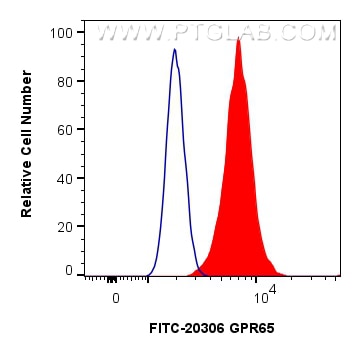GPR65 Polyklonaler Antikörper
GPR65 Polyklonal Antikörper für FC (Intra), ELISA
Wirt / Isotyp
Kaninchen / IgG
Getestete Reaktivität
human
Anwendung
FC (Intra), ELISA
Konjugation
FITC Fluorescent Dye
Kat-Nr. : FITC-20306
Synonyme
Geprüfte Anwendungen
| Erfolgreiche Detektion in FC (Intra) | RAW 264.7-Zellen |
Empfohlene Verdünnung
| Anwendung | Verdünnung |
|---|---|
| Durchflusszytometrie (FC) (INTRA) | FC (INTRA) : 0.8 ug per 10^6 cells in a 100 µl suspension |
| It is recommended that this reagent should be titrated in each testing system to obtain optimal results. | |
| Sample-dependent, check data in validation data gallery | |
Produktinformation
FITC-20306 bindet in FC (Intra), ELISA GPR65 und zeigt Reaktivität mit human
| Getestete Reaktivität | human |
| Wirt / Isotyp | Kaninchen / IgG |
| Klonalität | Polyklonal |
| Typ | Antikörper |
| Immunogen | GPR65 fusion protein Ag14139 |
| Vollständiger Name | G protein-coupled receptor 65 |
| Berechnetes Molekulargewicht | 337 aa, 39 kDa |
| GenBank-Zugangsnummer | BC035633 |
| Gene symbol | GPR65 |
| Gene ID (NCBI) | 8477 |
| Konjugation | FITC Fluorescent Dye |
| Excitation/Emission maxima wavelengths | 498 nm / 526 nm |
| Form | Liquid |
| Reinigungsmethode | Antigen-Affinitätsreinigung |
| Lagerungspuffer | PBS with 50% glycerol, 0.05% Proclin300, 0.5% BSA |
| Lagerungsbedingungen | Bei -20°C lagern. Vor Licht schützen. Nach dem Versand ein Jahr stabil. Aliquotieren ist bei -20oC Lagerung nicht notwendig. 20ul Größen enthalten 0,1% BSA. |
Hintergrundinformationen
GPR65 (G protein-coupled receptor 65) was defined originally as T-cell death-associated gene 8 (TDAG8), functions as a proton-sensing receptor, and is also sensitive to psychosine (PMID: 35343079). GPR65 promotes adaptation to an acidic environment to enhance cell survival and proliferation, thereby promoting tumor development (PMID: 36852075).
Protokolle
| PRODUKTSPEZIFISCHE PROTOKOLLE | |
|---|---|
| FC protocol for FITC GPR65 antibody FITC-20306 | Download protocol |
| STANDARD-PROTOKOLLE | |
|---|---|
| Klicken Sie hier, um unsere Standardprotokolle anzuzeigen |


